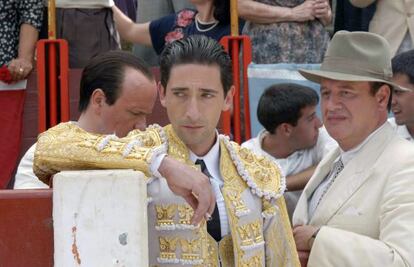Six years on, 'Manolete' at last gets a run through Spanish theaters
"Doomed" movie about matador is finally released in domestic market

The release of the movie Manolete on 51 screens across Spain on Friday will bring to an end one of the longest and most scandalous episodes in Spanish cinema history. The film seemed destined for glory, with a cast featuring international stars and an 11-million euro budget, but it ended up branded as cursed, costing more than double what was planned and suffering the same kind of luck as its doomed subject, the legendary matador "Manolete."
For its producer, Andrés Vicente Gómez, the movie's release closes "the biggest failure" of his career: "I've had it up to here with this film. But I'm glad it's being released: at least my mother will stop asking me when Manolete is coming out."
The film stars Adrien Brody as the famous bullfighter and Penélope Cruz as his lover, Lupe Sino, and it recounts the last few days of Manolete's life, before he was killed in the ring in Linares, Jaén province, on August 29, 1947. "At first we started looking at the possibility of doing a typical premiere, but that couldn't be because of the actors' commitments," explains Félix Velázquez, whose small distribution company Premium Cine is releasing the film. "It's difficult to get them together after so many years and so many ups and downs.
"The producers offered us [the film] in May, just before the summer. We were reticent at first because everybody in the business knows it is a cursed movie, but in the end we accepted. We chose the date thinking that it was close to the anniversary of Manolete's death..."
At least my mother will stop asking when 'Manolete' is coming out"
"We are not going to do a premiere or anything," says Gómez. "We are only releasing it to comply with requirements, and so nobody keeps on referring to it as a 'cursed movie.' I'm neither proud nor happy but I think in spite of everything the result is fine."
Manolete was filmed on locations around Spain in 2006, and was first scheduled to be released in 2007 to coincide with the 60th anniversary of Manolete's death. The problems began during the shoot, above all because of a clash of approaches between the producer and the film's Dutch director, Menno Meyjes. The use of real animals in the bullfighting scenes complicated the shoot greatly, and delays meant higher and higher costs.
It was the debt the film ran up with the set builders, Construcciones Escénicas Moya, that proved the main obstacle to the film's release. The company managed to get the film impounded until 2011.
"The problem hasn't been resolved," says José Luis Moya, the manager of the firm, which is now in liquidation. "The production company still owes us 500,000 euros. [...] It only partly paid it, in one of the court cases, two years ago. Just enough to be able to release it now. But we still have two lawsuits filed through the criminal court since a year and a half ago. One has been given leave to go ahead and the other is pending admission. The box office takings are impounded in one of the cases, so in as far as it affects us it is better to release it once - perhaps that way we might get paid."
Eight versions of the film exist and the one being shown in Spain is the seventh
The film has already been released in Italy, France, Japan, the UK and the US. Eight different versions of the film exist and the one being shown in Spain is the seventh. "The eighth is the director's cut, which was released in France," explains Gómez. "My condition with [the director] was that if it was a failure in France, we would release the seventh version, edited without his involvement."
The reviews outside of Spain have verged on disastrous, adding yet another morbid element to the film. In 2010 Variety noted that, among other problems with its script, the movie overlooks the political landscape of those years. "The film seems to portray Lupe as the Yoko Ono of bullfighting, responsible in large part for the great toreador's downfall. But it leaves out perhaps the major reason why she was so hated by his entourage: she had left-wing sympathies while many of them were fervent supporters of the dictatorship. Without any political background, the most we can surmise is that Lupe is a 'whore,' as everyone openly calls her throughout the film."
"I will never do another bullfighting movie," says Gómez. "When I started out in cinema, I worked on Jorge Grau's El espontáneo and then on Más cornadas da el hambre, and there were always problems. I should have remembered what Orson Welles said. Simply, that bullfighting and cinema are not a good mix."
Tu suscripción se está usando en otro dispositivo
¿Quieres añadir otro usuario a tu suscripción?
Si continúas leyendo en este dispositivo, no se podrá leer en el otro.
FlechaTu suscripción se está usando en otro dispositivo y solo puedes acceder a EL PAÍS desde un dispositivo a la vez.
Si quieres compartir tu cuenta, cambia tu suscripción a la modalidad Premium, así podrás añadir otro usuario. Cada uno accederá con su propia cuenta de email, lo que os permitirá personalizar vuestra experiencia en EL PAÍS.
¿Tienes una suscripción de empresa? Accede aquí para contratar más cuentas.
En el caso de no saber quién está usando tu cuenta, te recomendamos cambiar tu contraseña aquí.
Si decides continuar compartiendo tu cuenta, este mensaje se mostrará en tu dispositivo y en el de la otra persona que está usando tu cuenta de forma indefinida, afectando a tu experiencia de lectura. Puedes consultar aquí los términos y condiciones de la suscripción digital.









































